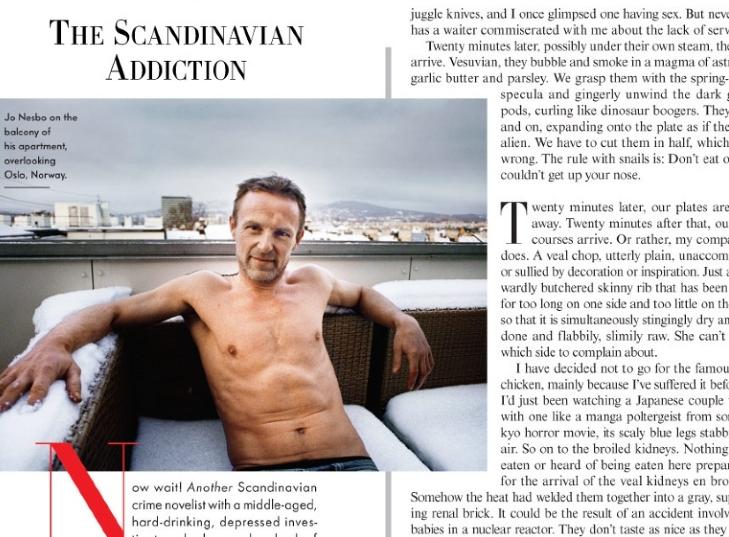 I normally write my reviews in English, but as I cannot find any indication that Middagen (original Dutch title Het Dinner) exists in English, I'm writing this in Norwegian.
I normally write my reviews in English, but as I cannot find any indication that Middagen (original Dutch title Het Dinner) exists in English, I'm writing this in Norwegian.Middagen (utgitt på Pax forlag) er en skikkelig saftig biff av en roman! For en litteraturviter som meg selv er det ekstremt mye å ta tak i og utforske. I så måte er dette en roman som man med letthet kan lese flere ganger, og oppdage nye ting ved hver lesning.
Handlingen er tilsynelatende enkel: to brødre skal møtes på restaurant med sine koner. Fortelleren er én av brødrene, og gjennom hans tanker, som han delvis skjuler og delvis avslører for leseren, får man fort inntrykk av at det er noe underliggende her; noe kommer til å skje.
Scenen settes. Vi er i restauranten, og fortelleren går ofte i detalj på hendelsene som skjer rundt ham, for eksempel den pekende lillefingeren til kelneren, som gjør at scenen blir levende for leseren. Samtidig får vi tilbakeblikk på hendelser som har skjedd tidligere, og som fortelleren, i sine mange tankerekker, får plutselige (eller svært kalkulerte?) assosiasjoner til. Tilbakeblikkene er nøkkelhendelser som litt etter litt er med på å gi leseren et helhetlig bilde av hva vi egentlig er vitne til under denne middagen.
Romanens er inndelt i fem deler som er strukturert rundt middagen: Aperitiff, Forrett, Hovedrett, Dessert og Tips. Scenen settes i hver enkelt del av måltidet (og boken), og så "forlater" jeg-personen scenen for å vise oss tilbakeblikkene. Dermed fungerer fortellingen både på et konkret, og på et mer abstrakt plan samtidig.
Som leser sympatiserer man ofte med jeg-fortelleren og dens syn på verden. Koch bruker sin jeg-forteller på mesterlig vis, og er ekstremt dyktig til å manipulerer leseren. Fortelleren kontrollerer hva man vet, og når man eventuelt får vite noe, og leseren har hele tiden en følelse av å bli ført litt bak lyset, at fortelleren leker litt med oss. I tillegg er det også en tradisjonell oppfatning at jeg-fortellere representerer gode grunnverdier; i denne romanen må man være forsiktig med slike antagelser.
Som leser blir jeg dratt mer og mer inn i nettet som fortelleren spinner rundt meg. Et utdrag fra side 51 bygger opp spenningen:
"Men likevel var det skjedd noe som fikk meg til å bevare håpet om en eksplosjon senere på kvelden. Det var som med pistolen i teaterstykket: Hvis det blir vist fram en pistol i første akt, kan du banne på at det vil bli skutt med den i siste akt. Det er dramaets lov. Ifølge samme lov er det til og med forbudt å vise fram en pistol hvis det ikke blir skutt med den."
Her blir man direkte fortalt at noe ganske dramatisk kommer til å skje i "siste akt", og ja, det blir skutt med pistolen i siste akt, men fra et litt uventet hold. Før den tid rulles den mørke hemmeligheten etterhvert opp, og omfanget fortsetter å sjokkere. En nesten pervers fascinasjon preger lesingen av avsløringene. Man vil holde for øynene, men samtidig klarer man ikke se vekk. Man blir tvunget til en konfrontasjon med ondskapen, og en metaforisk beroligende klapp på skulderen kan man se langt etter.
Et sentralt tema i romanen er å ha en lykkelig vs. en ulykkelig familie; den tynne linjen som skiller disse to, og hvor langt man er villig til å gå for å sikre lykken.
Et annet tema er "violence vs. victim", eller vold vs. offer. Her problematiseres offer-rollen, og det stilles spørsmål ved hvorvidt et offer egentlig er uskyldig, og i hvilken grad et offer på et vis påtar seg denne rollen. Tilknyttet dette er det også en interessant diskusjon om dødsstraff, som blir nesten litt ironisk pga. hendelser som på dette punktet er avslørt, og også om man setter dette i sammenheng med et abort-spørsmål som nevnes. Kanskje noe man kunne skrive et essay om?
Et siste tema jeg ønsker å nevne er history (his story), eller historie vs sannheten. Ettersom det er en jeg-forteller, blir hele historien (bokstavelig talt) fortalt slik han oppfatter hendelsene. Fortelleren innrømmer at han gjerne pynter på sannheten, og da vet vi som lesere at det også gjelder historien vi sitter og leser. På toppen av dette får vi vite at jeg-fortelleren tidligere jobbet som nettopp historielærer, men må forlate jobben pga. versjonen eller tolkningen av andre verdenskrig som han presenterer til elevene sine. Ja, for ikke å snakke om hvordan han også avgjør, helt åpenlyst og direkte, hvorvidt det er interessant eller ikke for leseren å vite hva slags sykdom hans kone hadde, eller hva han hadde sagt til en av elevene sine som gjor at han ble oppmuntret til å forlate jobben. Eller hva en viss fostervannsprøve muligens kunne ha avslørt for 16, eller for den saks skyld, 40, år siden.
I konklusjon vil jeg si at dette er en skikkelig bra roman. I was taken for a real ride, men jeg likte det. Språket er ekstremt godt, og scenene fungerer svært bra i samspill med tilbakeblikkene. Spenningen i boka er til å ta og føle på. Boken kan leses både satirisk og kontroversielt, og det gjør den interessant og innholdsrik. Den er tankevekkende og tvinger leseren til å reflektere over ubehagelige spørsmål. Jeg må innrømme at til tider er boken rett og slett ukomfortabel lesing, men dette er gjort med overlegg; det skal være vondt. Samtidig er fortelleren så smidig og nesten "god-snakkende" ovenfor leseren at man nesten tar seg i å nikke og smile på siste side. Men bare nesten (eller bare litt).
Middagen er en vellykket og intelligent roman som provoserer og inspirerer. Boken kan trygt anbefales til de som liker litt tankevekkende litteratur med litt å "tygge i".






